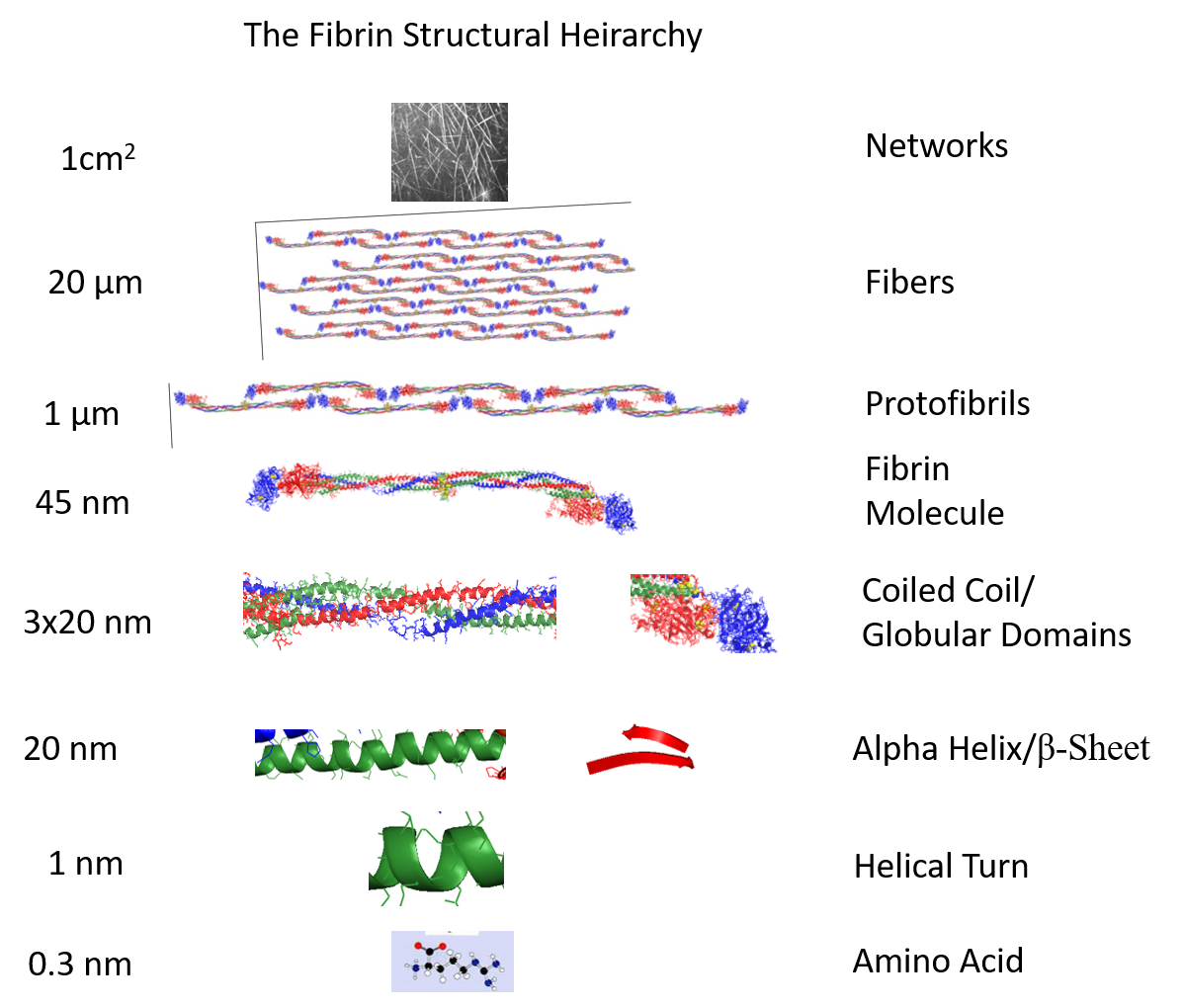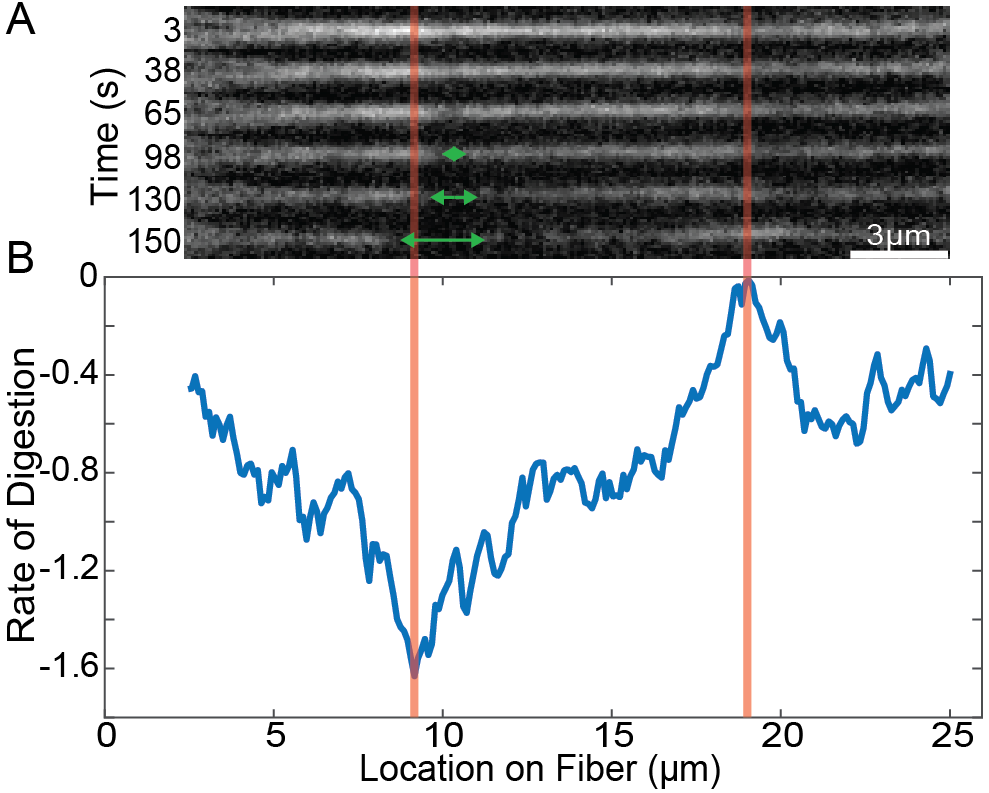Research Activities
Our research group studies the role of mechanical force in regulating biological structure and function. We use a variety of experimental approaches including protein engineering, tubidimetry, electron and fluorescence microscopy, and Fluorescence Resonance Energy Transfer (FRET) in order to study the mechanome at various length and timescales. Some of our projects are described below.
-
 Mechano-Structural Coupling in Blood Clotting We study the mechanical and structural properties of blood clotting proteins such as fibrin(ogen). Fibrin fibers, which hold blood clots together, are among the most elastic materials in nature. We map out the molecular and structural origins of these properties using protein engineering and variety of innovative tools. Success in these projects will provide novel avenues in therapeutics and biomaterials design.
Mechano-Structural Coupling in Blood Clotting We study the mechanical and structural properties of blood clotting proteins such as fibrin(ogen). Fibrin fibers, which hold blood clots together, are among the most elastic materials in nature. We map out the molecular and structural origins of these properties using protein engineering and variety of innovative tools. Success in these projects will provide novel avenues in therapeutics and biomaterials design.
Researchers: Aravind Elangovan, Dylan Miller
Collaborators: Marthin Guthold (Wake Forest), Adam Offenbacher (ECU), Mehmet Sen(Houston), Brittany Bannish (UCO), Janelia AIC -
 Molecular Mechano-cleavage Protein cleavage (proteolysis) plays an important role in enzyme activation/inactivation, cell signaling, and blood clotting. We are interested in how force can allosterically control proteolysis. Recent projects and publications have focused on the role of tension in regulating the digestion of blood clots (fibrinolysis). Additional projects involve designing novel mechano-cleavable proteins
Molecular Mechano-cleavage Protein cleavage (proteolysis) plays an important role in enzyme activation/inactivation, cell signaling, and blood clotting. We are interested in how force can allosterically control proteolysis. Recent projects and publications have focused on the role of tension in regulating the digestion of blood clots (fibrinolysis). Additional projects involve designing novel mechano-cleavable proteins
Researchers: Josh Packard
Collaborators: Brittany Bannish (UCO), Valerie Tutwiler(Rutgers), and Marthin Guthold (Wake Forest) -
 Structure and Function of Blood Clotting Proteins Blood clotting proteins are designed to resist mechanical forces. Many proteins, such as fibrinogen, have structual features or post-translational modifications that enable their specialized functions. Moreover these proteins undergo dynamic conformational changes that may regulate their function. We study structure-function relationships within hemostasis using a variety of light scattering and electron microscopy techniques.
Structure and Function of Blood Clotting Proteins Blood clotting proteins are designed to resist mechanical forces. Many proteins, such as fibrinogen, have structual features or post-translational modifications that enable their specialized functions. Moreover these proteins undergo dynamic conformational changes that may regulate their function. We study structure-function relationships within hemostasis using a variety of light scattering and electron microscopy techniques.
Researchers: Maria Gonzalez Mundarain, Wyatt Peele
Collaborators: Mehmet Sen(Houston), Adam Offenbacher (ECU), Linda May (ECU), Mario Borgnia (NIEHS). -
 Engineering 3D Microenvironments for Cell Culture Our work seeks to engineer novel cell culture environments that mimic physiological conditions in the body. Developing novel approaches to cell culturing will enable faster translation from bench to bedside, helping to bypass experimental artifacts that can arise from 2D cell culturing.
Engineering 3D Microenvironments for Cell Culture Our work seeks to engineer novel cell culture environments that mimic physiological conditions in the body. Developing novel approaches to cell culturing will enable faster translation from bench to bedside, helping to bypass experimental artifacts that can arise from 2D cell culturing.
Researchers: Leah Rane Jones, Johan Mavungu
Collaborators: Rukiyah Van Dross (ECU)
Positions Available
Postdoctoral Fellows
Supported postdoctoral fellows should contact Dr. Hudson if you are interested in research in the Hudson Lab.
Graduate Students
The Hudson Lab is always seeking motivated graduate students. Students interested in working in the Hudson Lab should apply to the ECU graduate school. Email Dr. Hudson if you want to discuss specific areas of interest.
Undergraduate Students
Undergraduate students are essential to the Hudson Lab. Research positions are available for reliable, highly self-motivated students willing work hard and spend significant time in the lab. Students must be able to work and think independently, keep detailed records, and seek help when necessary. Email Dr. Hudson if you want to discuss specific areas of interest.
Thanks for Visiting!
Check back regularly for updates and events.